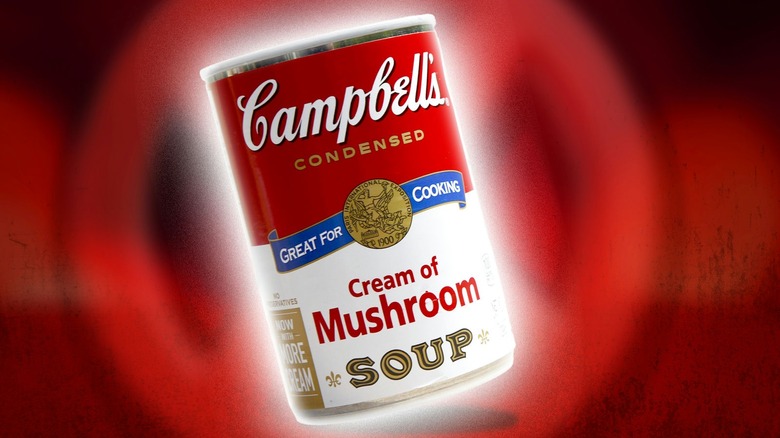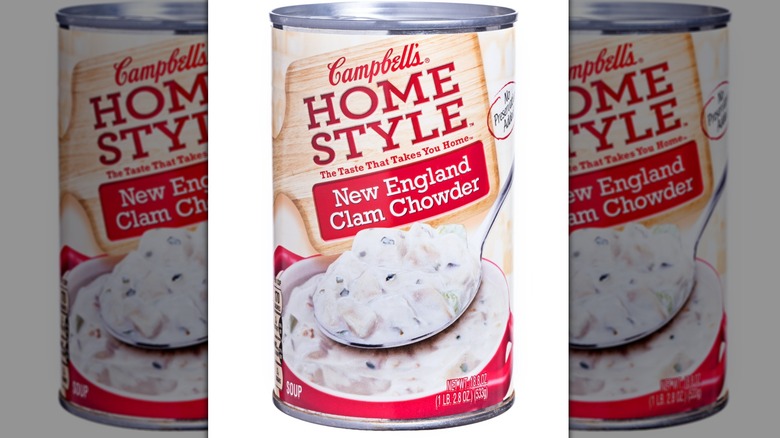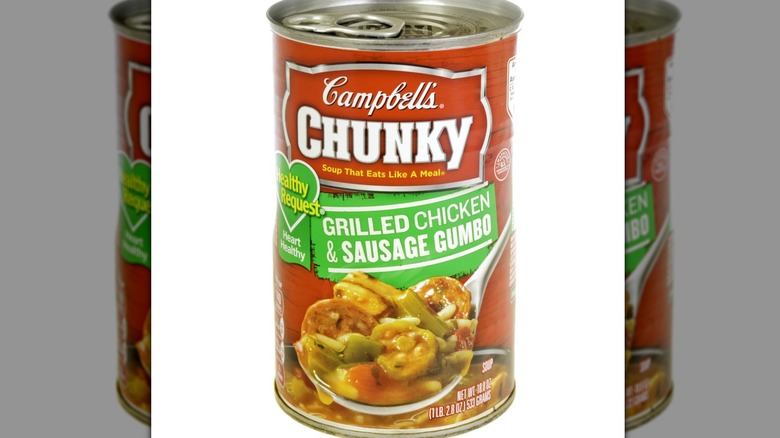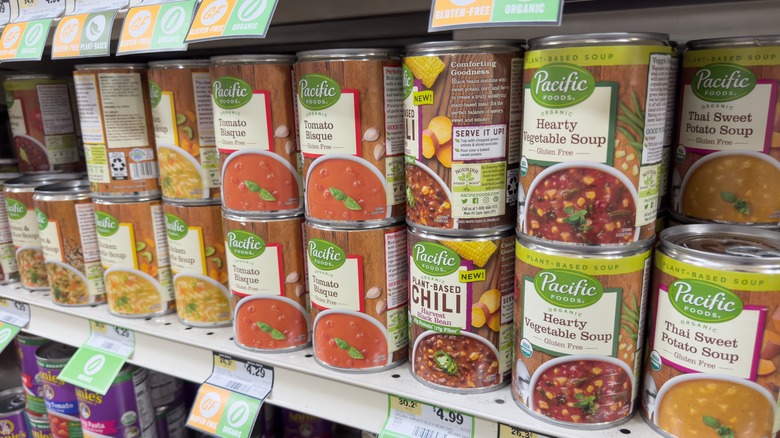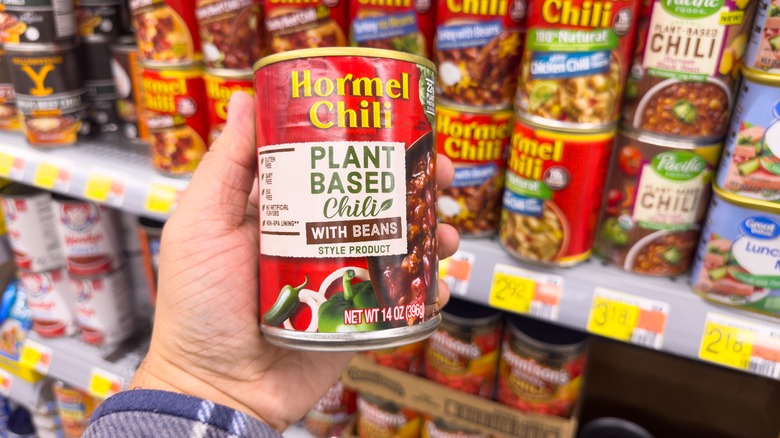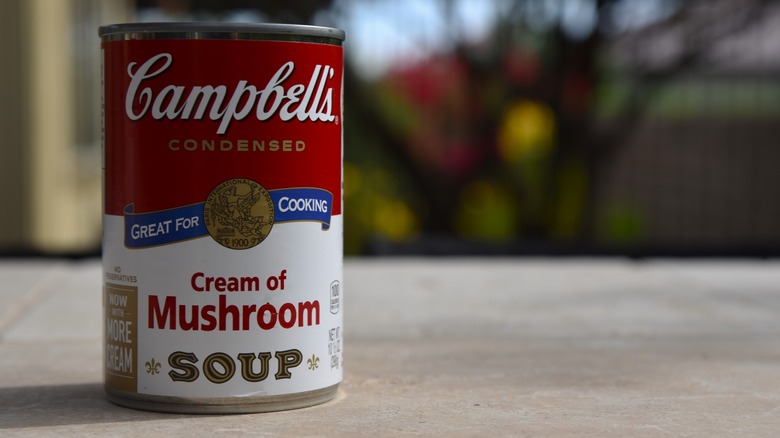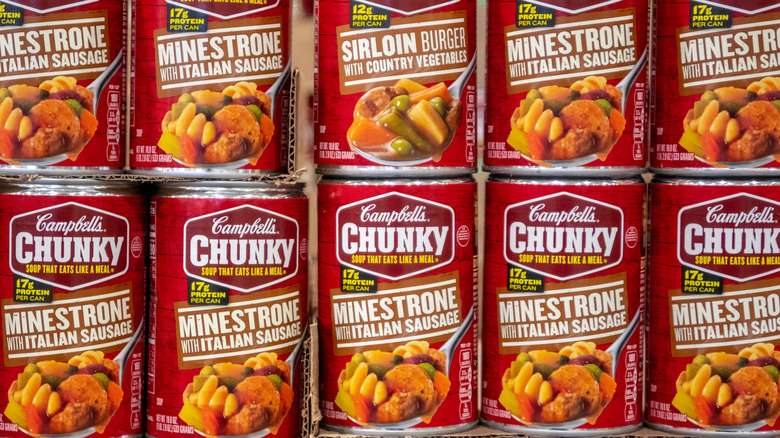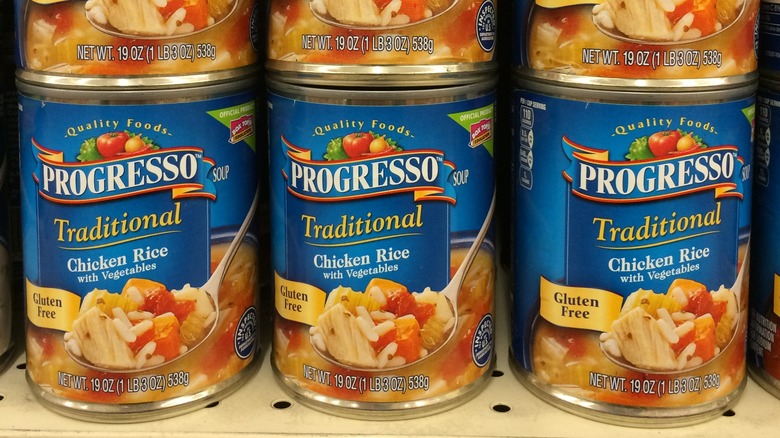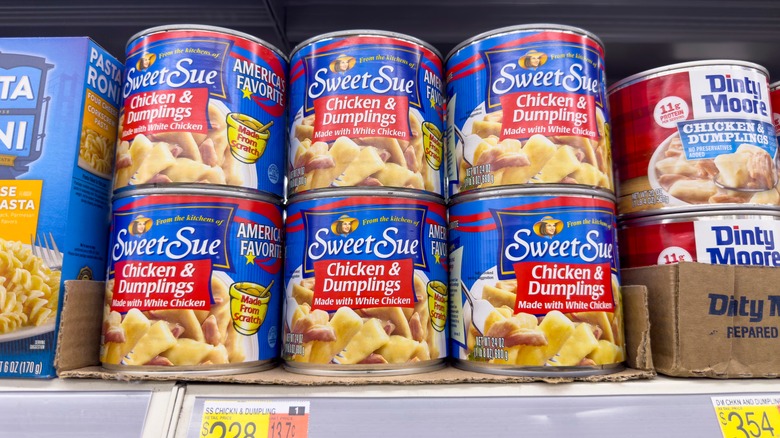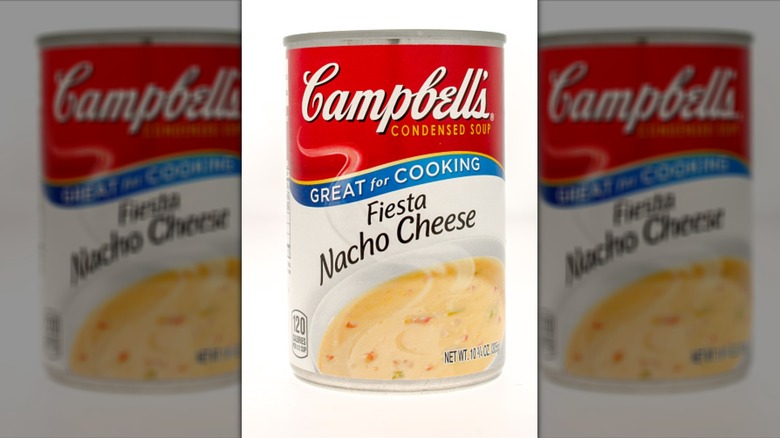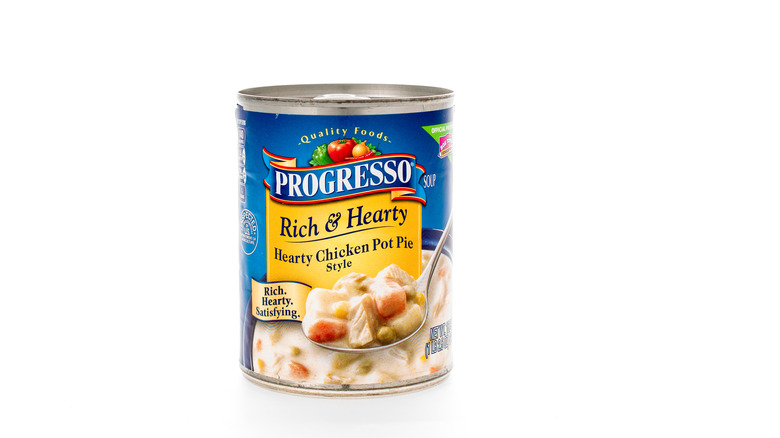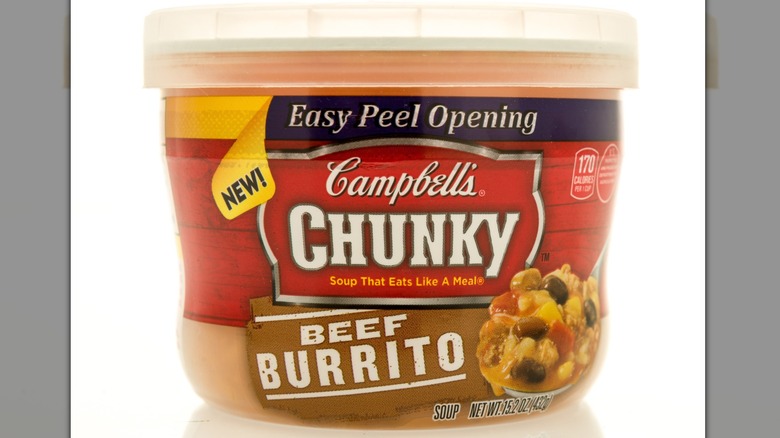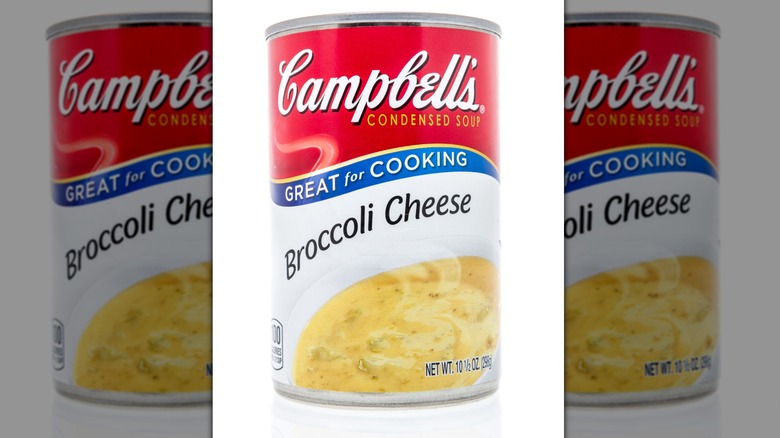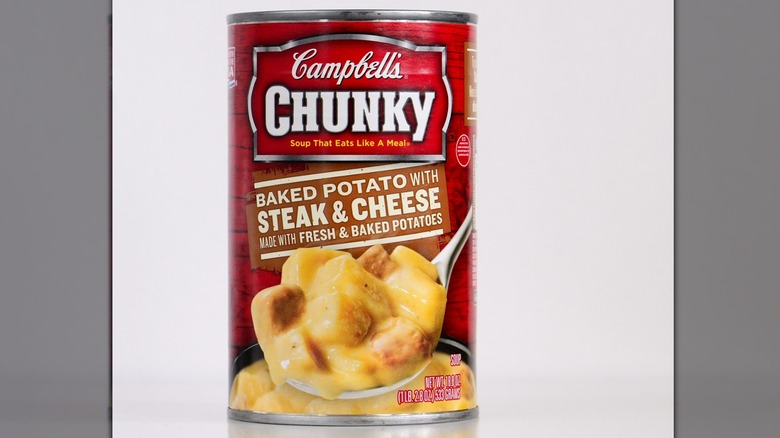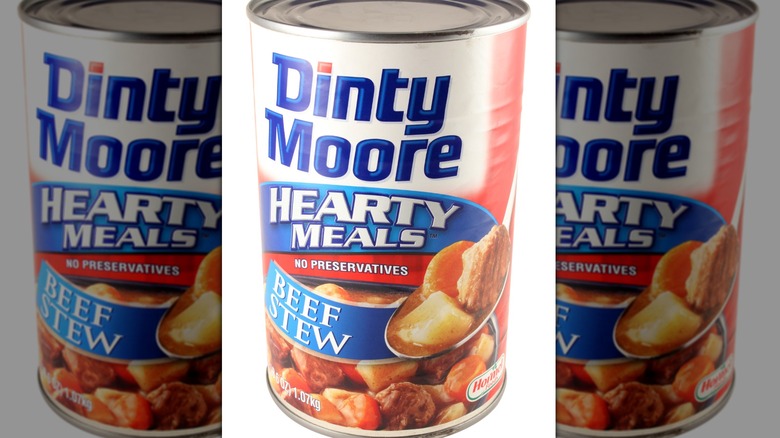The 14 Most Unhealthy Canned Soups You Can Buy At The Store
We may receive a commission on purchases made from links.
Canned foods come with plenty of benefits. They're convenient. All you really have to do is open a can and then microwave the contents or, if you're feeling really fancy, put the contents on the stovetop to simmer for a few minutes. They're affordable, often sold for just a few dollars a pop. They also seemingly last forever in your pantry. However, not all canned foods are as healthy as they could be, as is the case with canned soups.
While canned soups come in handy in a variety of situations — that cream of chicken soup is a necessity for your mom's favorite casserole, for example, and who can deny a classic bowl of Campbell's on a cold winter's day — don't just assume they're as healthy as what you might make from scratch. Just like canned vegetables, canned soup can really rake in the sodium and, depending on the soup variety, the fat. Additionally, some canned soups are just made with super-sus ingredients that will have you thinking twice about popping that lid off. Here are some of the unhealthiest types of canned soups you can buy at the store.
Chowder
Some may argue chowder isn't really soup. Chowder features a creamy base, whereas soup is made with stock. Like a stew, chowder is on the thicker side. However, for the purpose of this article, think of "canned soup" as any liquid-based meal that you might find in a can, in the soup aisle — chowders, stews, and chilis included. Unfortunately, chowder is one of the unhealthier options you can make when you're perusing the options in this aisle.
For example, Progresso's Chicken Corn Chowder Flavored with Bacon comes with 850 milligrams of sodium, 10 milligrams of cholesterol, and 7 grams of fat (plus 1.5 grams of saturated fat) per serving, with two servings in a can. Meanwhile, Campbell's Homestyle New England Clam Chowder comes with 1,490 milligrams of sodium, 19 grams of fat (plus 2.5 grams of saturated fat), and 15 milligrams of cholesterol per can. And who doesn't eat the whole can of soup? When you do, you'll be well over half your daily recommended sodium intake.
Beyond the actual nutrition facts, canned seafood chowder might not always contain the highest-quality seafood or even much seafood at all. If clams, for example, aren't listed as one of the first three ingredients in the ingredients list, there's probably not much clam in your can. Additionally, some chowders might not contain the most sustainably sourced of seafood; look for sustainability claims on the can. If there are none, chances are the brand isn't too proud of where it sourced its seafood.
Gumbo
Who doesn't love a gumbo? Filled with chicken, andouille sausage, okra, celery, peppers, rice, and a rich blend of spices, it's a tasty meal that, when coming from a can, doesn't require all the slicing, dicing, and hours of simmering that the homemade variant might. However, watch out for the sodium in canned gumbos. Many pack in more than half your daily allotment of sodium per can.
This is the case with Campbell's Chunky Chicken and Sausage Gumbo, which offers 1,470 milligrams of sodium per can, or 64% of your daily recommended intake. It also provides 10% of your daily recommended saturated fat and 15% of your daily recommended cholesterol.
If you are craving some canned gumbo, but are watching your sodium, you might reach for the Campbell's Healthy Request version of the same soup and assume you're good to go. However, don't just throw this can into your cart without a second thought. While it may be branded as "healthy," the soup still has 890 milligrams of sodium per can, so 39% of your daily intake. It also has the exact same amount of fat as the original version.
Bisque
Bisques may appear healthy, at first glance. After all, they're simple and straightforward, without a ton of ingredients. They're French. They're often served in high-end restaurants — but they're also available in a can. Traditionally made from a seafood-derived stock (but more and more vegetable-based) and incorporating some kind of creamy ingredient, they're adjacent to a chowder, but without all the chunky bites of seafood, potatoes, corn, and similar ingredients. Unfortunately, canned bisques are also adjacent to canned chowder in being one of the unhealthier canned soups you can buy.
Beyond the sodium and fat found lurking in many canned bisques, you might be surprised at the amount of sugar many canned bisques also contain. For example, Pacific Foods' Organic Carrot Ginger Bisque contains, per can, 25% of your daily saturated fat, 48% of your daily sodium, and 22% of your daily added sugar. Pacific Foods' Organic Tomato Bisque contains, per can, 50% of your daily saturated fat, 49% of your daily sodium, and 20% of your daily added sugar. Campbell's Condensed Tomato Bisque is even worse; for the entire can, you'll get approximately 55% of your daily added sugar and 95% of your daily sodium.
Chili
Chili is one of those foods that, all depending on how you cook it and what you include in it, can be either really healthy or really unhealthy. Canned chilis frequently toe the line of unhealthy. A few of the worst offenders? There's Wolf Brand Chili with Beans, with its per-can 19 grams of saturated fat (95% of your daily allotment) and 2,670 milligrams of sodium (116% of your daily allotment). Campbell's Chunky Chili Mac with beans, macaroni, and meat contains 75% of your daily recommended sodium per can.
Think you'll be safe with a plant-based chili? Not so fast. Gardein's Plant-Based Chili without beans comes with 73% of your daily sodium intake per can. Hormel's Plant-Based Chili fares little better, with 69% of your daily sodium intake per can. Even low-fat vegan options don't fare well in the sodium department, with Amy's Black Bean Chili still giving you 50% of your daily recommended sodium per can.
Cream of mushroom
"Cream of" soups are a pantry necessity for many home cooks. They make a fantastic thickening agent and base for casseroles of myriad varieties and, with a little work, you can zhuzh it up to be so much more than just a globby condensed cream. However certain "cream of" soups can really pile on the sodium.
One of the worst of the worst is Amazon Fresh's Condensed Cream of Mushroom Soup, which, per can offers 89% of your daily recommended allotment of sodium. The 18% of your daily fat intake isn't all that attractive either. Pacific Foods' Organic Cream of Mushroom Soup fares slightly better, with 66% of your daily recommended sodium per can, but comes with 25% of your daily recommended saturated fat. It's Campbell's classic Cream of Mushroom Soup that's the worst, though, with 2.5 servings per can and 37% of your daily sodium in each serving, for a total of 92.5% of your daily recommended sodium intake per can.
Italian-style soup
Italian-style soups are often rich and hearty. Imagine minestrones packed with a cornucopia of vegetables and legumes, Italian wedding soup with savory meatballs, or pastina soup with an abundance of star-shaped noodles. They're just the kind of comfort food you want when you're getting over a little cold or snuggling up at home on a blustery day. However, pick the wrong canned Italian-style soup and you may feel a little worse for wear afterward.
Campbell's Chunky Minestrone with Italian Sausage, while offering a nice serving of fiber, protein, and potassium, also comes with 65% of your daily recommended sodium per can. Think you'll save yourself some sodium by choosing a soup that bypasses the sausage and uses turkey meatballs instead? Think again. Campbell's Homestyle Italian-Style Chicken with Turkey Meatballs soup comes with nearly the same amount of sodium: 64% of your daily recommended intake per can. If you opt for a creamy Italian soup, like Progresso's Rich & Hearty Three Cheese Tortellini soup, things get even worse, as the large amounts of sodium (66% of your daily recommended intake per can) join large amounts of fat — in this case, 36% of your daily recommended saturated fat per can.
Creamy versions of traditional soup
If you're carving something a little more filling and rib-sticking than your standard soup variety, you might reach for a creamy version of a traditional soup. However, don't make the mistake of assuming that these soups are close in nutritional value, because the only thing that changed was adding a bit of cream. The differences can be dramatic.
This is the case when you compare Progresso's Traditional Chicken and Wild Rice soup with Progresso's Rich & Hearty Creamy Roasted Chicken and Wild Rice soup. With the former, you'll get, per can, 190 calories, 64% of your daily recommended sodium, 1% of your daily recommended total fat, and 12% of your daily recommended carbohydrates. In contrast, with the creamy variety, you get, per can, 260 calories, 76% of your daily recommended sodium, 11% of your daily recommended total fat, and 13% of your daily recommended carbohydrates.
Dumpling soup
Depending on the cuisine, your dumplings will differ. Ask for a bowl of chicken 'n dumplings in the American South and you'll get a chicken broth-based soup filled with shredded or chunked chicken and either dollops or strips of a doughy dumpling. Obviously, this differs from dumplings in Asian cuisine, where the dough is typically wrapped around some sort of filling.
Whatever your preferred dumpling, though, think twice about eating them when they come in a can of store-bought soup. Many canned dumpling soups come with a hefty side of sodium. Sweet Sue Chicken & Dumplings is one of the worst offenders, with 129% of your daily recommended sodium packed into one can. Campbell's Creamy Chicken & Dumplings soup is only slightly better, with 84% of your daily recommended sodium in each can; add in the 70 milligrams of cholesterol and 21 grams of fat, and you might want to simply take the effort to learn how to make your own dumplings at home.
Cheddar cheese soup
Okay, so it makes sense why this might exist. You can use condensed cheddar cheese soup in a swathe of cheesy dishes, from simple macaroni and cheese to casseroles to scalloped or mashed potatoes. However, the convenience comes with a cost. Campbell's Condensed Cheddar Cheese Soup comes with all of your daily allotment of sodium, plus more, in each can, at 870 milligrams per serving and 2.5 servings per can. Don't think you can avoid the sodium by purchasing Campbell's "Heart Healthy" version of this condensed soup, either; it still has more than half the daily recommended amount of sodium for adults, in each can.
The easy work around for this is, of course, to just make your own cheesy sauce wherever you might normally use a can of condensed cheddar cheese soup. Combining a roux, milk, and the cheese of your choosing allows you to more easily control not just the amount of sodium that's in your cheesy mixture, but also the flavor profile. For example, if you've been buying Campbell's nacho cheese variant of this soup, simply add in some spices and chiles or jalapeños.
Pot pie soup
What's the best part of a pot pie? The filling, of course! Why not, then, take the pot pie filling and turn it into a creamy soup, sans crust? You can find a variety of pot pie-inspired soups in the canned soup aisle these days, but if you're hankering for the pot pie flavors, you may just want to make your own at home. Pot pie soups come with a heavy dose of sodium and a high fat content.
For example, you've got Campbell's Chunk Pub-Style Chicken Pot Pie soup, which comes with 1,720 milligrams of sodium per can, or 75% of your daily recommended intake. That's accompanied by 24% of your daily recommended intake of fat, inclusive of 20% of your daily recommended intake of saturated fat. There's also a not-insignificant 70 milligrams of cholesterol, or just under a fourth of what most adults should get per day. Progresso's Rich & Hearty Chicken Pot Pie soup isn't any better, with even more sodium, at 1,800 milligrams, though slightly less fat and carbs.
Soup masquerading as another food
This is a weird little subset of foods. At some point, someone woke up and decided we needed to take some of America's most beloved foods, foods that have nothing whatsoever in common with soup — not like chicken pot pie, which at least could be confused for soup if you take away the crust and squint — and transform them into just that. Over the years, we've had enchilada soup (the tamest of them all, to be honest), burger soup, and Philly cheesesteak soup, among others.
Unfortunately, often times, these soups are sodium-heavy. Campbell's Chunky Spicy Sirloin Burger soup will give you 75% of your daily recommended sodium in one can, along with 25% of your daily recommended saturated fat. Campbell's Chunky Chicken Burrito soup (while not technically in a can) comes with nearly half your daily recommended sodium, though in a smaller portion size. Some things, like burritos and sandwiches, simply shouldn't be soup.
Broccoli cheese soup
Don't think that this soup is a healthy choice just because it's green. Yes, there might be broccoli, but there's a whole lot of other stuff in this canned soup that can derail your health goals.
Like many of Campbell's condensed soups, the brand's Condensed Broccoli Cheese soup comes with more than your daily recommended sodium in a single can, at 38% of your daily recommended intake per serving and 2.5 servings per can. Progresso's Traditional Broccoli Cheese soup offers less sodium but more fat, with 74% of your daily recommended intake of sodium per can, 32% of your daily recommended total fat per can, and 46% of your daily recommended saturated fat per can. Progresso does sell a "light" version of this canned soup, but it's not really that much lighter, with still 66% of your daily recommended sodium per can, and 26% of your daily recommended saturated fat per can.
Baked potato soup
Yes, baked potatoes can be a wonderfully nourishing part of your diet, even loaded baked potatoes, if you're overall following a balanced diet. However, take that potato and turn it into soup, cram it into a can, and you have yet another instance of a normally benign food being served up with exorbitant amounts of sodium and fat.
Progresso's Loaded Potato with Bacon soup comes with about 70% of your daily recommended sodium per can, plus a third of your daily recommended fat intake. Campbell's Chunky Baked Potato with Steak & Cheese soup is even worse, with nearly 80% of your daily recommended sodium per can; at least it's slightly lower on the fat, with just under a third of your daily recommended intake per can. The brand's potato soup with cheese and bacon, rather than steak, is much the same. Luckily, making baked potato soup at home is easier than you might think, and allows you to control just how much sodium and fat goes into every spoonful.
Beef stew
Beef stew from a can is a divisive little grocery item. Some wouldn't touch it with a five-foot pole, while others think it's a totally tasty, convenient meal. Typically, the division comes down to the beef itself, with the meat's quality called into question.
Whatever your stance on beef stew, though, no one can deny that it leaves a little to be desired on the nutrition side. The classic Dinty Moore Beef Stew comes with 82% of your daily recommended sodium per can, as well as 40% of your daily recommended saturated fat per can. The brand does offer a 25% less-sodium variant, but it still comes with just as much saturated fat and total fat. Armour Star Classic Beef Stew comes with an even more impressive amount of sodium, at 108% per can, and 46% of your daily recommended saturated fat per can.
In short, if you have a hankering for some beef, potatoes, and carrots, in a simmering gravy-esque broth, just make a pot roast. It might require a little more effort, but your arteries will thank you.
